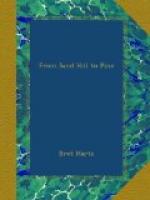He dismissed the cab at the street corner and began to reconnoitre the house. It had a large garden in the rear, reclaimed from the adjacent “scrub oak” infested sand hill, and protected by a high wall. If he could scale that wall, he could command the premises. It was a bright morning; she might be tempted into the garden. A taller scrub oak grew near the wall; to the mountain-bred Bray it was an easy matter to swing himself from it to the wall, and he did. But his momentum was so great that he touched the wall only to be obliged to leap down into the garden to save himself from falling there. He heard a little cry, felt his feet strike some tin utensil, and rolled on the ground beside Eugenia and her overturned watering-pot.
They both struggled to their feet with an astonishment that turned to laughter in their eyes and the same thought in the minds of each.
“But we are not on the mountains now, Mr. Bray,” said Eugenia, taking her handkerchief at last from her sobering face and straightening eyebrows.
“But we are quits,” said Bray. “And you now know my real name. I only came here to tell you why I could not answer your letter the same day. I never got it—I mean,” he added hurriedly, “another man got it first.”
She threw up her head, and her face grew pale. “Another man got it,” she repeated, “and you let another man”—
“No, no,” interrupted Bray imploringly. “You don’t understand. One of my partners went to the spring that afternoon, and found it; but he neither knows who sent it, nor for whom it was intended.” He hastily recounted Parkhurst’s story, his mysterious belief, and his interpretation of the note. The color came back to her face and the smile to her lips and eyes. “I had gone twice to the spring after I saw you, but I couldn’t bear its deserted look without you,” he added boldly. Here, seeing her face grew grave again, he added, “But how did you get the letter to the spring? and how did you know that it was found that day?”
It was her turn to look embarrassed and entreating, but the combination was charming in her proud face. “I got the little schoolboy at the summit,” she said, with girlish hesitation, “to take the note. He knew the spring, but he didn’t know you. I told him—it was very foolish, I know—to wait until you came for water, to be certain that you got the note, to wait until you came up, for I thought you might question him, or give him some word.” Her face was quite rosy now. “But,” she added, and her lip took a divine pout, “he said he waited two hours; that you never took the least concern of the letter or him, but went around the mountain side, peering and picking in every hole and corner of it, and then he got tired and ran away. Of course I understand it now, it wasn’t you; but oh, please; I beg you, Mr. Bray, don’t!”
Bray released the little hand which he had impulsively caught, and which had allowed itself to be detained for a blissful moment.




